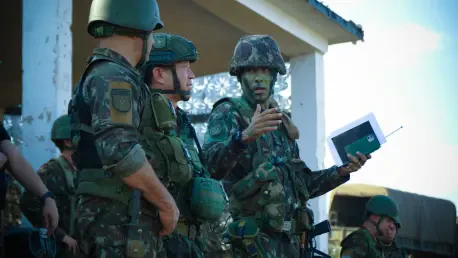In an era where military operations demand precision and efficiency, the integration of cutting-edge technology into logistics has become a game-changer for armed forces worldwide. A groundbreaking collaboration has recently emerged in South Korea, where a leading provider of IoT and AI-driven supply chain solutions has joined forces with the nation’s military to revolutionize logistical operations. This partnership marks a significant milestone in the digital transformation of military supply chains, promising enhanced reliability and streamlined processes in high-stakes environments. By leveraging advanced tools and expertise, this alliance aims to set a new standard for how military logistics can adapt to modern challenges, ensuring that critical assets are managed with unparalleled accuracy. The implications of this development extend beyond immediate operational gains, hinting at a future where private-sector innovations play a pivotal role in strengthening public and defense sectors.
Revolutionizing Military Logistics with Technology
The collaboration between a prominent IoT and AI solutions provider and the Republic of Korea (R.O.K.) Army Consolidated Supply Depot represents a transformative step forward in military logistics. Formalized through a Memorandum of Understanding (MOU), this partnership focuses on integrating sophisticated technological capabilities to enhance the efficiency of supply chain operations. The technology in question includes IoT devices designed to monitor vital conditions like temperature, humidity, and shock during transit, while also tracking location in real time. These devices feed data into an AI platform that generates predictive insights, allowing for proactive management of military assets. Such innovations are expected to minimize risks and optimize the flow of resources, ensuring that the Army can maintain operational readiness under any circumstances. This initiative underscores a growing recognition of the need for digital tools to address the complexities of modern military logistics.
Beyond the deployment of IoT and AI technologies, this alliance also encompasses joint research and technical advisory services to further modernize logistical frameworks. The R.O.K. Army Consolidated Supply Depot, tasked with managing all logistical support for the nation’s army, brings a strong foundation of innovation to the table. Notably, its 1st Supply Group has already earned recognition as a pioneer in adopting smart logistics practices, including the use of unmanned forklifts and autonomous guided vehicles (AGVs). Building on this progressive approach, the integration of advanced ICT solutions through this partnership aims to elevate operational standards even further. The focus is not only on immediate improvements but also on creating a scalable model that could adapt to evolving needs. By combining expertise from both sides, the collaboration seeks to address unique challenges in military environments, where precision and reliability are non-negotiable.
Bridging Private Innovation and Public Sector Needs
This partnership marks a significant expansion for the IoT and AI solutions provider into the public sector, particularly within a mission-critical military context. With a proven track record in demanding industries such as pharmaceuticals and precision manufacturing, the company’s technology has demonstrated adaptability and robustness across various high-stakes scenarios. Applying these capabilities to military logistics validates the versatility of the solutions and highlights their potential to meet stringent requirements. Industry leaders have noted that this collaboration could serve as a stepping stone for broader digital transformation across other branches of the South Korean military, such as the Navy and Air Force. The successful implementation of these tools in one domain may inspire confidence in their application elsewhere, potentially reshaping how defense logistics are managed on a national scale.
A broader trend is also evident in this alliance, as military organizations globally increasingly turn to private-sector innovations to tackle logistical challenges. An official from the R.O.K. Army Consolidated Supply Depot emphasized the importance of adopting advanced technologies from commercial entities to build a more sophisticated and efficient system. This perspective reflects a shared understanding that collaboration between public and private sectors can yield substantial benefits, particularly in areas requiring rapid adaptation to technological advancements. The integration of real-time data validation and predictive analytics into military operations exemplifies how such partnerships can enhance decision-making and resource allocation. As defense needs grow more complex, these cross-sector efforts are likely to become a cornerstone of operational strategy, ensuring that armed forces remain agile and well-equipped.
Setting the Stage for Future Advancements
Reflecting on the strides made through this collaboration, it’s clear that the MOU between the technology provider and the R.O.K. Army Consolidated Supply Depot laid a strong foundation for innovation in military logistics. The joint efforts to implement IoT and AI solutions addressed critical operational needs, enhancing the reliability of supply chains in demanding contexts. This partnership not only showcased the potential of private-sector technology in public applications but also highlighted the Army’s commitment to embracing modern tools for better efficiency. The achievements of this initiative stand as a testament to the power of strategic alliances in driving meaningful change.
Looking ahead, the focus should shift to scaling these advancements across broader military domains while refining the technologies to meet diverse challenges. Exploring opportunities for integration with other defense branches could amplify the impact of these innovations. Additionally, continuous investment in research and development will be essential to keep pace with emerging threats and logistical demands. Encouraging further collaboration between technology experts and military leaders can ensure that solutions remain relevant and effective, paving the way for a future where smart logistics underpin national security.









